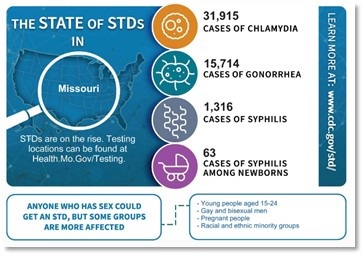JEFFERSON CITY, MO – Sexually transmitted disease (STD) rates are at an all-time high according to the Centers for Disease Control and Prevention (CDC). Nationally, there has been a 74% increase in syphilis over five years, as well as more than 2,800 congenital syphilis cases in 2021, with 220 resulting in stillbirths and infant deaths.
This STI Awareness Week, the CDC released Sexually Transmitted Disease Surveillance, 2021, which provides the most current and complete data for nationally notifiable sexually transmitted infections.
During the COVID-19 pandemic, which caused disruptions nationally in STD-related prevention and care activities, numbers of STDs continued to rise. Missouri is experiencing the same rate increases, especially in syphilis and congenital syphilis (when a mother passes the infection on to her baby during pregnancy). In 2015, Missouri recorded two cases of congenital syphilis. In 2021, this number increased to 63.
The Missouri Department of Health and Senior Services (DHSS) encourages the public to practice safe sex and routine testing for STDs as Missouri continues to see a significant increase in syphilis. Syphilis is a sexually transmitted infection that, without treatment, can cause serious health problems. Syphilis is curable with the right antibiotics from a health care provider.
A person can get syphilis by direct contact with a syphilis sore during sexual activity. Each stage has different signs and symptoms. Syphilis can be treated and cured with antibiotics yet many cases go undiagnosed and untreated, leading to increased transmission and future negative health consequences.
Syphilis can also spread from a mother with syphilis to her unborn baby (congenital syphilis). Having syphilis during pregnancy can lead to a baby born with a low birth weight and can increase the chance that the mother will deliver her baby too early or stillborn. All pregnant women in Missouri should be screened for syphilis. Pregnant women should be tested at the first prenatal visit, in the third trimester (28 weeks), and at delivery regardless of perceived risk. No infant should leave the hospital without the mother’s serological status having been documented at least once during pregnancy and preferably again at delivery.
Condoms can lessen the spread of syphilis by preventing contact with a sore; however sometimes contact with any unprotected areas can be the cause of spread. The only way to completely avoid STDs is to abstain from any sexual activity.
DHSS continues to work with the St. Louis STI/HIV Prevention and Training Center to inform and educate health care providers about current evidence-based prevention, diagnosis and treatment recommendations. Additionally, DHSS has been working to increase the number of Disease Intervention Specialists (DIS) who conduct contact tracing, investigations, and partner services for syphilis and HIV. The department is also continuing to expand its STD and HIV testing sites offering free testing. To find an STD and HIV testing site near you, go to Health.Mo.Gov/Testing.
Public education and outreach also continues, and a social and digital media kit for syphilis is available for partners to use to inform their local communities.
Discovered on: 2023-04-14 17:36:54
Source: Rate of STDs continues to rise nationally and in Missouri – Newstalk KZRG



